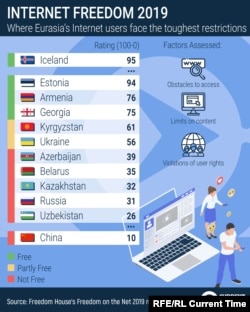“Information sharing is power,” Internet pioneer Vint Cerf once said. And in Eurasia, it’s power that most states still want to control.
The majority of countries in Current Time’s coverage zone received negative ratings in Freedom on the Net 2019, an annual, worldwide report from the Washington, DC-based rights watchdog Freedom House.
Generally, countries with the spottiest civil-rights records fared the worst.
Azerbaijan, Belarus, Kazakhstan, Kyrgyzstan, and Russia all slipped down in the rankings. Kazakhstan’s blocks on Internet access during protests and Russia’s plans for a “sovereign Internet” led to negative assessments.
Uzbekistan, which Freedom House evaluates overall as “not free,” posted a marginal improvement in its Internet-rights assessment, thanks to its decision to stop blocking the sites of some international news outlets (including RFE/RL) and human rights organizations.
Only three countries received a “free” rating.
Estonia, already renowned for its embrace of the Internet, ranked as the most cyber-liberal country in Eurasia, just one point after top-ranked Iceland, according to the report.
In the South Caucasus, where government, civil society, media, and ordinary citizens tend to use social media as a non-stop discussion forum, Armenia and Georgia both ranked as free, but not without areas of concern. Online harassment of those critical of the government persists in Armenia, while in Georgia, cases of online intimidation and “government-affiliated bots and users” targeting political news coverage occurred.
The study did not examine Latvia, Lithuania, Tajikistan, and Turkmenistan. Freedom House did not specify the reason for their absence, but stated that the 65 surveyed countries were selected “to provide a representative sample” of “geographical diversity and economic development” and “varying levels of political and media freedom.”




